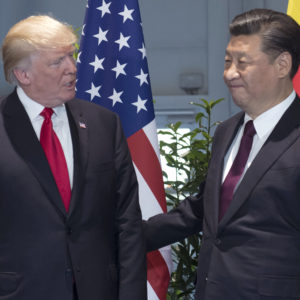Even as he finds himself in hot water, Steve Bannon doesn’t seem very optimistic when it comes to the fate of the Trump White House. The president’s former chief strategist declared earlier this month that President Trump has only days to save his administration from supposedly imminent collapse, telling Axios reporter Jonathan Swan that the president had to take concrete steps toward delivering the “America First” policies he campaigned on before the first anniversary of his inauguration.
Bannon urged Trump to press ahead with campaign priorities, cracking down on illegal immigration and throwing up tough new tariffs on the Chinese imports undermining American manufacturers.
Should the president be listening to the advice of his former aide? Attacks on the White House and the president’s family aside, Bannon’s suggestions on trade would wind up hurting the Americans who elected Trump far more than they would help.
The tariffs Bannon wants the president to slap on steel and aluminum imports offer an important example of the explosive moves for which the disgraced and sidelined strategist is still pushing. Dumping from China has long been a major bone of contention with American manufacturers because, thanks to rampant overproduction, Beijing’s state-owned behemoths have been able to run roughshod over global markets while undermining competitors both at home and around the world.
The president signaled his administration would take decisive action in standing up to the Chinese, but the brand of economic nationalism Bannon wants to see hasn’t yet taken shape.
That could soon change. The Commerce Department has already handed the White House the result of its investigation into steel imports and will do the same for aluminum imports in a matter of days, giving the president 90 days to gauge exactly how much is too much for American national security.
The results of the Commerce probes come on the heels of the new national security strategy, which a senior administration official said last month had bolstered the case for trade actions designed to protect U.S. economic interests. Those include possible import tariffs on both metals.
All of this should sound well and good. President Trump will stand up to the Chinese and breathe new life into America’s manufacturing industries. If Bannon’s brand of populist trade policy has its way, however, it won’t just be Chinese steel and aluminum being hit with taxes on the U.S. market. Perfectly fair imports from other nations, which are critical to the nation’s economic well-being, might wind up being labeled as threats and get caught in the crossfire.
Some of our most important partners are worried about the implications. In terms of primary (unfinished) aluminum, for example, only 5 percent of the U.S. supply actually comes from China. Nearly three-fifths of it actually comes from Canada, whose industry is so closely intertwined with ours that federal law considers them one and the same, while Russia is the second-largest supplier.
Fighting back against China by starting a trade war with key partners in Canada and Europe would do nothing to protect American workers or our national security. Instead, universal tariffs on steel and aluminum would rob U.S. manufacturers of the metal that helps them create jobs and keep our manufacturing base.
Unlike the Chinese tycoons that flout trade rules by hiding massive stockpiles of metal in the Mexican desert, these companies are committed to playing by the rules. Rusal, for example, supports thousands of jobs by supplying primary aluminum to the car industry, construction companies, packaging and other sectors.
While the Chinese government let its companies burn coal to pump out cheap metal like no tomorrow, Rusal and players like Norsk Hydro make aluminum the same way Alcoa does: with hydropower. Subjecting American companies that depend on these materials to higher costs could put many of them out of business, hurting domestic manufacturing even more than the Chinese already have.
Not that Steve Bannon cares. For all his bluster, he clearly doesn’t take his own tough line on China seriously. The supposed guru took a secret meeting with a senior Chinese Communist Party official less than a month after he declared the United States was at “economic war with China.”
More important, there are better ways to hit China for its unfair practices. The White House has been taking what the president would call a “tough and smart” approach since Bannon took his leave, working with the European Union, Japan and other countries to go after Chinese market manipulation and fighting market economy status for Beijing at the World Trade Organization. Instead of blanket tariffs, the Commerce Department can take a precision-based approach with investigations into individual threats like aluminum foil imports.
The lessons we learn from these metals wars can also be applied to other disputes. China has already done considerable damage to U.S. companies and interests with its actions on intellectual property, hacking trade secrets but also sending spies to Iowa to steal corn seeds. Last August, the Trump administration launched an investigation into Beijing’s practice of forcing companies to share intellectual property as a condition of doing business in China.
Rather than listen to Bannon’s self-defined vision of how to put “America First,” President Trump should keep on doing what he’s been doing: telling Steve his ride on the Trump Train is over.

